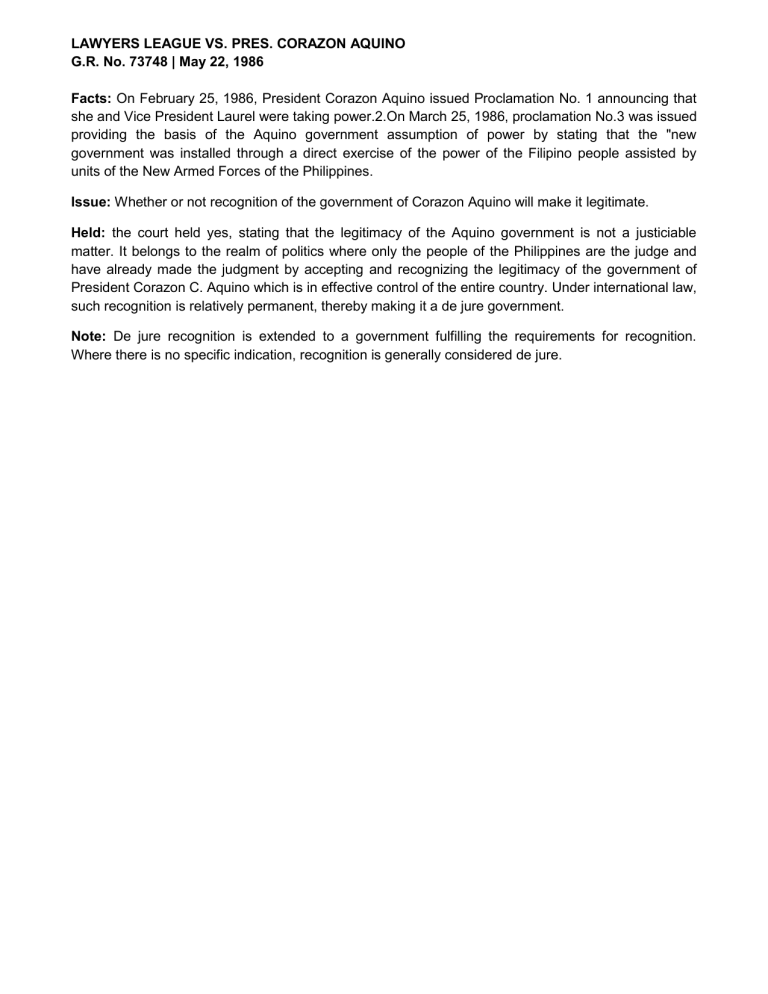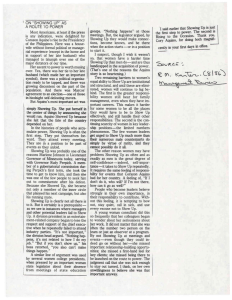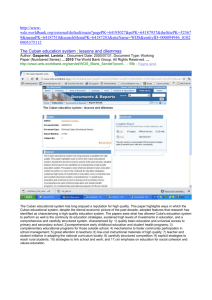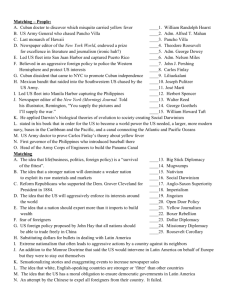
LAWYERS LEAGUE VS. PRES. CORAZON AQUINO G.R. No. 73748 | May 22, 1986 Facts: On February 25, 1986, President Corazon Aquino issued Proclamation No. 1 announcing that she and Vice President Laurel were taking power.2.On March 25, 1986, proclamation No.3 was issued providing the basis of the Aquino government assumption of power by stating that the "new government was installed through a direct exercise of the power of the Filipino people assisted by units of the New Armed Forces of the Philippines. Issue: Whether or not recognition of the government of Corazon Aquino will make it legitimate. Held: the court held yes, stating that the legitimacy of the Aquino government is not a justiciable matter. It belongs to the realm of politics where only the people of the Philippines are the judge and have already made the judgment by accepting and recognizing the legitimacy of the government of President Corazon C. Aquino which is in effective control of the entire country. Under international law, such recognition is relatively permanent, thereby making it a de jure government. Note: De jure recognition is extended to a government fulfilling the requirements for recognition. Where there is no specific indication, recognition is generally considered de jure. BANCO NACIONAL DE CUBA VS. SABBATINO 375 US 398, 1964 Facts: In 1960, Farr, Whitlock & Co. ("Farr"), an American commodity broker, contracted to purchase Cuban sugar from a wholly owned subsidiary of Compania Azucarera Vertientes-Camaguey de Cuba ("CAV") whose capital stock was owned principally by United States residents. Farr agreed to pay for the sugar in New York upon presentation of the shipping documents and a sight draft. The sugar covered by the contract between Farr, Whitlock and C. A. V. was loaded, destined for Morocco, onto the S. S. Hornfels, which was standing offshore at the Cuban port of Jucaro (Santa Maria). On the day loading commenced, the Cuban President and Prime Minister, acting pursuant to Law No. 851, issued Executive Power Resolution No. 1. It provided for the compulsory expropriation of all property and enterprises, and of rights and interests arising therefrom, of certain listed companies, including C. A. V., wholly or principally owned by American nationals. The preamble reiterated the alleged injustice of the American reduction of the Cuban sugar quota and emphasized the importance of Cuba's serving as an example for other countries to follow "in their struggle to free themselves from the brutal claws of Imperialism. Farr had entered into a contract, identical to those with CAV, with Banco Nacional De Cuba, an instrumentality of the Cuban government in order to obtain consent from the Cuban government before a ship carrying sugar could leave Cuban waters. Another such instrumentality to which the bank had assigned the bill of lading instituted an action in the United States District Court for the Southern District of New York to recover the proceeds of the bill of lading. The district court granted summary judgment against Banco Nacional De Cuba on the basis that the Cuban expropriation decree violated international law; the United States Court of Appeals for the Second Circuit affirmed. Banco Nacional De Cuba appealed. Issue: W/N the courts of the United States can inquire into the validity of the public acts that a recognized foreign sovereign power committed within its own territory? Held: No, the US Court held that the judiciary, in line with the Act of State Doctrine will not examine the validity of a taking of property within its own territory by a foreign sovereign government recognized by this country in the absence of international agreements to the contrary, even if the taking violates customary international law. Even in a situation whereby international law has been violated, the clear implication of past cases is that the Act of State Doctrine is applicable because the Act of State doctrine does not deprive the courts of jurisdiction once acquire over a case. The damages of adjudicating the propriety of such expropriation acts, regardless of whether the State Department has it did in this case, asserted that the act violated international law are too far-reaching for the judicial branch to attempt. Hence the judgment of the court of appeals is reverse and the case remanded back to the district court. OETJEN VS. CENTRAL LEATHER CO., 246 US 297 Facts: The case involves the title to two large consignments of hides, which the plaintiff in error claims to own as assignee of Martinez & Co., a partnership engaged in business in the city of Torreon, Mexico, but which the defendant in error claims to own by purchase from the Finnegan- Brown Company, a Texas corporation which it is alleged purchased the hides in Mexico from General Francisco Villa on 1914. General Huerta declared himself Provisional President of Mexico after the assassination of the previous president; Afterwards, General Carranza, the then governor of the Coahuila, inaugurated a revolution against the claimed authority of Huerta and that civil war was at once entered upon between the followers and forces of the two leaders. When Gen. Carranza assumed the leadership, General Villa was commissioned as 'Commander of the North,' and was assigned to an independent command in that part of the country After several battles, the city of Torreon in the state of Coahuila was captured by General Villa. Immediately after the capture, Villa proposed levying a military contribution on the inhabitants, for the support of his army, for which the citizens discussed about and negotiations were made with Gen. Villa as to the amount to be paid. Martinez, the owner of Martinez & Co., was a dealer in hides in a large way in Torreon however when the City was captured, he fled the city and failed to pay the assessment imposed upon him, and so, the hides in controversy were seized by Gen. Villa to satisfy his obligations, these were then sold in Mexico to the Finnegan-Brown Company and thereafter shipped into the US after payment and were replevied. The petitioner claims that the seizure was invalid. The cases were commenced in a circuit court of New Jersey in which judgments were rendered for the defendants, which were affirmed by the Court of Errors and Appeals, and they are brought to US Court on the theory that the claim of title to the hides by the defendant in error is invalid because the confiscation is contrary to the provisions of the Hague convention of 1907 respecting the laws and customs of war on land. At the time of the seizure in 1913, the Carranza government controlled about two-thirds of Mexico but there was no government in that country recognized by US. On October 19, 1915, the government of the United States recognized the government of Carranza as the de facto government of the Republic of Mexico, and as the de jure government on August 31, 1917. Issue: W/N the recognition of the government has a retroactive effect on the act of states. W/N the seizure is valid considering that the government is a de jure government? Held: It is the principles of international law that when a government which originates in revolution or revolt is recognized by the political department of our government as the de jure government of the country in which it is established, such recognition is retroactive in effect and validates all the actions and conduct of the government so recognized from the commencement of its existence. Also, the act of state doctrine states that every sovereign state is bound to respect the independence of every other sovereign state, and the courts of one country will not sit in judgment on the acts of the government of another done within its own territory. Redress of grievances by reason of such acts must be obtained through the means open to be available of by sovereign powers as between themselves. In the case at bar, we have a duly commissioned military commander of what must be accepted as the legitimate government of Mexico, in the progress of a revolution. Plainly this was the action of the legitimate Mexican government when dealing with a Mexican citizen, and, the court, upon repeated decisions, states that such action is not subject to re-examination and modification by the courts of New Jersey. To permit the validity of the acts of one sovereign state to be reexamined and perhaps condemned by the courts of another would very certainly 'imperil the amicable relations between governments and vex the peace of nations. The remedy of the former owner, or of the purchaser from him, of the property in controversy, must be found in the courts of Mexico or through the diplomatic agencies of the political department of our government. PEOPLE VS. PERFECTO 43 PHIL 887 Note: Article 256 is found in Chapter V of title III of Book II of the Spanish Penal Code. Title I of Book II punishes the crimes of treason, crimes that endanger the peace or independence of the state, crimes against international law, and the crime of piracy. Note: The crime of lese majeste disappeared in the Philippines with the ratification of the Treaty of Paris. Ministers of the Crown have no place under the American flag. Facts: Mr. Gregorio Perfecto, an editor of newspaper La Nacion published an article, regarding the disappearance of documents in the Office of Fernando Guerrero, the Secretary of the Phil. Senate in connection. Such documents constituted the records of testimony given by witnesses in the investigation of oil companies. The article of Mr. Perfecto suggested that the difficulty in finding the perpetrators was due to an official concealment by the Senate. The article have the language which may have had the tendency to impeach the honesty, virtue, or reputation of members of the Philippine Senate, thereby possibly exposing them to public hatred, contempt, or ridicule, which is exactly libel. As a result, information was filed against him by an Assistant City fiscal constituting a violation of article 256 of the Penal Code. He was found guilty in the Municipal court and in the CFI. However, Perfecto moved for the dismissal of the case and question the enforceability of Article 256. Issue: W/N article 256 is abrogated by the change of Spanish to American Sovereignty over the Philippines? Held: It is a general principle of the public law on principle of state community, that on acquisition of territory, the previous political relations of the ceded region are totally abrogated. "Political" is here used to denominate the laws regulating the relations sustained by the inhabitants to the sovereign. Article 256 of the Spanish Penal Code was enacted by the Government of Spain to protect Spanish officials who were the representatives of the King. With the change of sovereignty, a new government, and a new theory of government, as set up in the Philippines. It was in no sense a continuation of the old, although merely for convenience certain of the existing institutions and laws were continued. The demands which the new government made, and makes, on the individual citizen are likewise different. No longer is there a Minister of the Crown or a person in authority of such exalted position that the citizen must speak of him only with bated breath. Article 256 of the Penal Code is contrary to the genius and fundamental principles of the American character and system of government. VILAS V. CITY OF MANILA, 220 U.S 345 Notes: The charter in force is act 183 of the Philippine Commission, and now may be found as chapters 68 to 75 of the compiled acts of the Philippine Commission. However, the charter contains no reference to the obligations or contracts of the old city. Act 183 – states that the inhabitants of the city of Manila, residing within the territory described in 2 of such act, are hereby constituted a municipality, which shall be known as the city of Manila, and by that name shall have perpetual succession, and shall possess all the rights of property herein granted or heretofore enjoyed and possessed by the city of Manila as organized under Spanish sovereignty. Facts: The petitioners were creditors of the City of Manila when it was still under Spanish sovereignty and has brought an action to recover the sum of money owed to him by the City which has since been reincorporated in 1901 under the act 183 of the Philippine Commission, following the cession of the Philippines to the United States under the Treaty of Paris. [During this era, decisions by the Philippine Supreme Court were reviewable by the US Supreme Court if the dispute involved a United States Treaty.] Respondents argue that the liability of the city was effectively extinguished by the change of sovereignty. Issue: Is the present municipality liable for the obligations of the city incurred prior to the cession to the United States? Held: Yes, for under international law on principle of state continuity, Liability is not extinguished. The contention that the liability of the city upon such obligations was destroyed by a mere change of sovereignty is one which is without a shadow of moral force. The city, acting as a corporation, possesses two kinds of powers: governmental and public. In view of the dual character of municipal corporations, there is no public reason for the presuming their total dissolution as a consequence of military occupation or territorial cession. The cession did not operate as an extinction or dissolution of corporations. The present city is, in every legal sense, the successor of the old. As such, it is entitled to the property and property rights of the predecessor corporation, and is, in law, subject to all of its liabilities. During that occupation and military administration the business of the city was carried on as usual. Taxes were assessed and taxes collected and expended for local purposes, and many of the officials carrying on the government were those found in office when the city was occupied. The continuity of the corporate city was not inconsistent with military occupation or the constitution or institutions of the occupying power. The juristic identity of the corporation has been in no wise affected, and, in law, the present city is, in every legal sense, the successor of the old. As such all rights of the predecessor are inherited by the successor, all obligations of the predecessors are likewise assumed.






